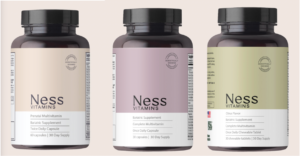
After bariatric surgery, all patients must take vitamins and supplements. As a result of the significant change in the digestive process and the reduction in food intake, vitamins and minerals are not absorbed as easily nor as frequently. All bariatric patients, at some point, have heard that vitamins and supplements must be taken, for life, after the surgery. And choosing what types of supplements are needed after surgery can be overwhelming. So we have put together a list of all the supplements to take after weight loss surgery as a bariatric patient to keep you from spending more on vitamins than you need to.
Supplements to Take After Weight Loss Surgery

1. Multivitamins:
The most vital supplement to take after weight loss surgery is the complete multi-vitamin. Multi-vitamins are a great way to get all the essential supplements you may need without having your entire pantry overtaken by vitamins. We recommend a high-potency chewable multivitamin containing a minimum of 18 mg of iron and 400 mcg of folic acid, selenium, copper, and zinc.
Multivitamins must be taken up to two times daily, depending on the brand of vitamin you are taking. If you have our Live Healthy MD Complete Multivitamins, you take it once daily. Yet, other brands such as the Bariatric Advantage Multi AE Complete or the Flinestone’s Complete Chewable will be required twice a day.
2. Calcium Citrate
Calcium is the most abundant mineral in the body and supports bone, blood vessel, and muscle function, as well as hormone secretion and nerve transmission. When you are calcium deficient, you may experience muscle aches, fatigue, dental problems, and bone breakage.
Bariatric patients who had the gastric bypass or the gastric sleeve must take 1500 mg per day of calcium citrate. If you had the duodenal switch, you would be required to take 2000 mg per day. To meet these recommendations, you will be required to take three doses a day.
As a bariatric patient, it is essential to remember to take calcium citrate, NOT the calcium carbonate supplements found at your local convenience store. Calcium carbonate is not absorbed as quickly as calcium citrate is.
3. Vitamin D
Vitamin D is a top noted micronutrient deficiency before and after bariatric surgery. Vitamin D is found in very few foods but is rather absorbed from the sun through the skin. Vitamin D is essential for the promotion of calcium absorption and balance, immunity, and cellular function. Patients who are vitamin D deficient may experience bone or muscle pain.
We require our patients to take 3000 international units (IU) a day. You may purchase your Vitamin D from a specialized retailer, such as the Live Healthy MD online shop, or you may pick up any Vitamin D3 supplement at your local convenience store.
If you are already taking the Live Healthy MD multivitamin, you do not need to take a Vitamin D supplement as our multivitamin already contains the recommended dosage.
4. Vitamin B12
B12 is a water-soluble vitamin found in animal products and fortified grains. It is necessary for red blood cell formation, DNA synthesis, and brain function. When you are B12 deficient, symptoms may include fatigue, weakness, loss of appetite, and constipation.
The Live Healthy MD multivitamin already has the recommended dosage of B12 in each tablet. So, patients who are not taking these multivitamins are advised to take a B12 supplements.
If you are taking B12, you must take 500 to 1000 mcg a day as either a tablet or liquid under the tongue. Patients have the option to purchase a sublingual B12 supplement online. Yet, some patients may opt-in for a B12 injection once a month, or if their insurance covers it, they may want to be prescribed Nascbol nasal spray that is taken once weekly.
5. Iron Supplements
Iron is an essential element for blood production. It is a necessary mineral that aids in the structure and support of metabolism, growth, development, cellular functioning, and synthesis of hormones and connective tissues. When you are iron deficient, you may feel tired or dizzy, have a hard time remembering or concentrating, experience an increased heart rate, or have shortness of breath.
Similar to Vitamin D and B12, if you are already taking the Live Healthy MD multivitamin, you do not need to take an iron supplement. Yet if you choose to do so, you are advised to take 45 to 60 mg a day.
Conclusion
For patients who have had the gastric bypass, gastric sleeve, or duodenal switch, will be required to take vitamins for life after the surgery. Patients have three options for the combination of supplements to take after weight loss surgery.
Option 1: Individual Vitamins
Patients who are taking their vitamins individually will need to take the required dosages.
- Multivitamin; take two tablets before bed
- 1500 mg of Calcium Citrate; take 500 mg three times a day at least 2 hours apart
- 500 to 1000 mcg of B12; take sublingual form anytime during the day
- Iron; take as needed before bed
- 1500 IU Vitamin D; as needed anytime during the day
Option 2: Live Healthy MD Multi-Vitamin
- Live Healthy MD Multivitamin; take once daily before bed
- 1500 mg Calcium Citrate; take 500 mg three times a day at least 2 hours apart
Option 3: Nascobol Package (if insurance covers)
- B12 Nascobol Spray; spray in one nostril once per week
- Multivitamin; take two tablets before bed
- 1500 mg of Calcium Citrate + D3; take 500 mg three times a day at least 2 hours apart
- Iron; take three tablets before bed
- 1500 IU Vitamin D; as needed anytime during the day
There are many options and combinations for supplements to take after weight loss surgery. No matter which brand you choose to take, the only thing that matters is that you continue to be diligent about taking your vitamins to avoid any deficiencies.












